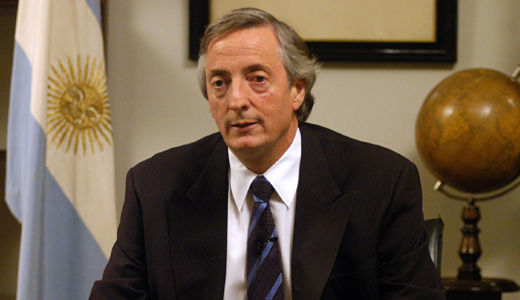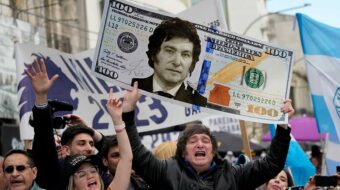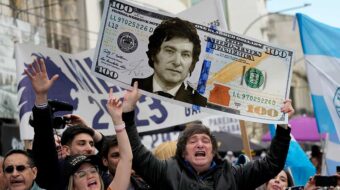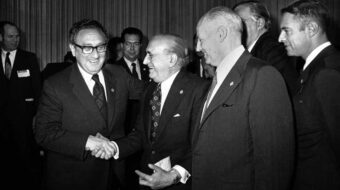
The sudden death of Nestor Kirchner, the Secretary General of UNASUR (Union of South American Nations), former president of Argentina and husband of the current president, Cristina Fernandez de Kirchner, has saddened and shaken Latin America. And now the right wing associated with the Argentine ruling class and international finance capital have their hopes up that they can reverse his progressive policies.
Kirchner, who was born in 1950, died of a heart attack at his home in el Calafate, Santa Cruz Province, on October 27.
Kirchner came out of the left-wing youth movement of the Justicialist Party, founded by President Juan Peron. But while some sectors of that party had embarked on a fascist trajectory, the Justicialist left had fought against the regime of Isabela Peron and then the bloody right-wing dictatorship which succeeded her.
Once the dictatorship ended, Kirchner entered electoral politics, winning the post of mayor of Rio Gallegos, Santa Cruz province, in 1986. He was elected governor of Santa Cruz province in 1991, and was considered to have provided competent and honest leadership characterized by benefits to the working class, leading to his reelection in 1995. Meanwhile the Justicialist president, Carlos Menem, was disgracing himself with massive corruption scandals. Kirchner began to be seen as the Peronist left’s answer to people like Menem. Subsequent to Menem’s presidency and that of his successor Eduardo Duhalde, the presidency passed into the hands of the Alliance Party’s Fernando de la Rua, who instituted sharper neo-liberal policies.
By 2001, the Argentine economy was on the ropes, and there was massive protest against the austerity program of the regime. Duhalde was brought back and instituted a sharp devaluation of the currency. By this time there was massive rejection of the entire spectrum of parties and leaders at the national level.
Kirchner was elected president on a left wing platform in 2003, but with a low vote total. Initially, many on the left did not trust him and thought he had been put in by the Peronists to pour cold water on the wave of factory seizures that was then going on.
But Kirchner stood up to right wing forces, including the coup prone military, allied himself with other left-wing governments in the hemisphere and, to the amazement of all, successfully forced international lending agencies to restructure Argentina’s debt by the simple method of telling them that if they didn’t restructure, they would not get a penny.
Kirchner continued to work to integrate the economies and societies of Latin American nations and to help them overcome imperialist hegemony. He and his team have played a role in the creation of key integrative organizations such as MERCOSUR and UNASUR . When his term ended in 2007, his wife, Cristina Fernandez de Kirchner, was elected by a much bigger vote that he had got. She played a strong role in trying to reverse the coup in Honduras in June of 2009.
But both the traditionalist right and the Peronist right are still strong in Argentina, and they managed to deprive Cristina Fernandez of her legislative majority in 2009. It was thought that Nestor Kirchner would be a strong presidential candidate in the general elections in October of 2011. Thus, while most of Latin America mourned Kirchner’s death, there was an instant uptick in the market for Argentine bonds, and business groups were all but openly joyful about the possibility of the right taking over the Argentine presidency once more.
The Secretary General of the Communist Party of Argentina, Patricio Echegaray, summarized in a statement Wednesday what Latin America owes to Nestor Kirchner:
“In the context of the processes of change which are happening in our America, the measures taken by ex-president in favor of the people’s sectors, Latin American integration, respect for human rights and the return to political debate, are an integral part of the legacy which Argentine society enjoys today [which allows us] to keep on advancing along the road of justice and social inclusion.
“From the Communist Party we extend our condolences to Madame President Cristina Fernandez de Kirchner and to his relatives and comrades in the struggle”
These feelings extended beyond Argentina’s borders. Prensa Latina reported that Bolivian President Evo Morales praised Kirchner’s “great commitment and faithfulness to South American integration”, defining his death as “a painful and irreparable loss for Argentina, South America and the world”.
Photo: Nestor Kirchner, wikipedia commons

MOST POPULAR TODAY


Zionist organizations leading campaign to stop ceasefire resolutions in D.C. area

High Court essentially bans demonstrations, freedom of assembly in Deep South

Afghanistan’s socialist years: The promising future killed off by U.S. imperialism

Communist Karol Cariola elected president of Chile’s legislature






Comments